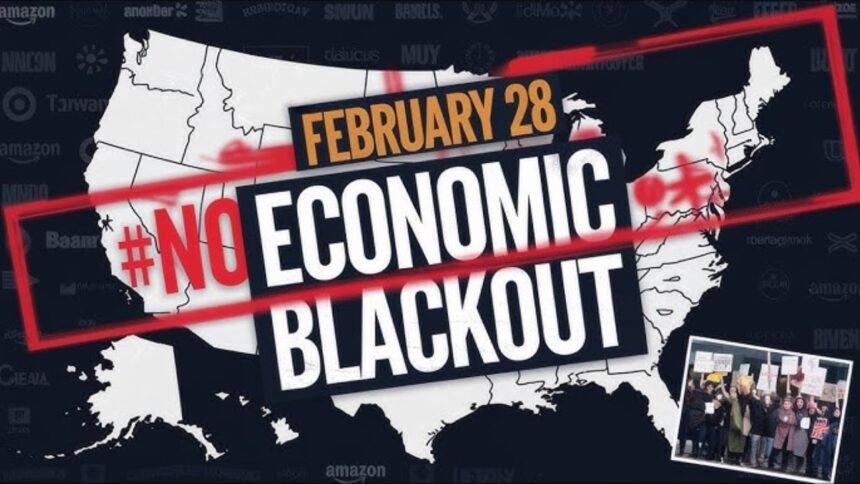In today’s interconnected world, the concept of a boycott economic blackout has become a powerful tool for Americans seeking to influence corporate behavior and social change. A boycott economic blackout refers to a coordinated effort where consumers intentionally avoid purchasing from certain companies or sectors to pressure them into ethical, political, or social reforms. This strategy, rooted in economic activism, leverages the collective spending power of consumers to disrupt business as usual and prompt meaningful change. Understanding how a boycott economic blackout works, its historic roots, and its effectiveness in modern America can empower citizens to make informed decisions that align with their values.
What Is a Boycott Economic Blackout?
At its core, a boycott economic blackout is a form of consumer activism that goes beyond a simple boycott. While a boycott commonly involves refusing to buy products from a specific company or brand, a boycott economic blackout expands this concept into a broader, often region-wide, economic withdrawal. This means that consumers avoid engaging economically with targeted industries or groups to create a significant financial impact. The goal is to cause enough economic disruption that the targeted entities reconsider their practices or policies.
Historically, boycotts have been instrumental in driving social change. For instance, the Montgomery Bus Boycott during the Civil Rights Movement not only challenged segregation laws but also tested the economic power of unified action. In modern terms, a boycott economic blackout can address issues like environmental sustainability, labor rights, or political corruption. By withdrawing economic support, consumers send a strong message that unethical behavior will result in tangible financial consequences.
The Mechanics Behind Boycott Economic Blackouts
The success of a boycott economic blackout hinges on coordination, communication, and widespread participation. In an era dominated by social media and digital communication, organizing such blackouts has become more feasible. Activists use platforms like Twitter, Instagram, and Facebook to spread awareness, mobilize supporters, and sustain momentum.
Moreover, the effectiveness of a boycott economic blackout depends on targeting companies or sectors where consumer spending has a direct impact on revenue. For example, boycotting fast fashion brands over unethical labor practices or certain tech giants due to data privacy concerns can disrupt profit margins if participation is large enough. Transitioning from individual consumer choices to collective action amplifies the financial pressure and increases the likelihood of change.
Nevertheless, these movements face challenges. Consumers may struggle with access to alternative products, or economic blackouts might inadvertently harm low-wage workers employed by the targeted companies. Therefore, strategic planning and clear communication are essential to maximize positive outcomes while minimizing unintended consequences.
Why Boycott Economic Blackouts Matter for Americans
In the US, where consumerism is a dominant force, the power of a boycott economic blackout cannot be underestimated. Americans spend trillions yearly on goods and services, and shifting even a fraction of this spending away from problematic companies can have wide-reaching effects. Furthermore, in a democratic society, economic decisions serve as a form of political expression.
The rise of ethical consumerism reflects a growing awareness among Americans about how their spending influences global issues such as climate change, workers’ rights, and corporate governance. Boycott economic blackouts offer a tangible way for people to align their wallets with their values. By doing so, they hold corporations accountable outside traditional political channels.
Dr. Maria Lopez, a professor of sociology at the University of Chicago, emphasizes this point:
“Boycott economic blackouts illustrate the democratization of economic power. When consumers band together to refuse business as usual, they reshape corporate behavior and contribute to a more ethical marketplace.”
Real-World Examples of Boycott Economic Blackouts
Several recent cases highlight the power and complexity of boycott economic blackouts in America. The 2018 boycott against major tech companies like Google and Facebook, triggered by privacy concerns and alleged misinformation, demonstrated how consumers could demand greater corporate responsibility. Although the financial impact was mixed, the movement pushed these companies to reevaluate data policies and transparency.
Similarly, the rush for sustainable fashion has led to boycotts targeting fast fashion retailers, pressuring them to adopt more ethical production methods. These movements not only affect profits but also encourage the industry to innovate toward eco-friendly alternatives.
It is important to note that boycott economic blackouts are most effective when combined with other forms of advocacy, such as shareholder activism, regulatory pressure, and public education campaigns. This multi-pronged approach creates a comprehensive pressure system for change.
Challenges and Criticisms of Boycott Economic Blackouts
Despite their potential, boycott economic blackouts face criticism and limitations. Critics argue that such movements may lack inclusivity, as not all consumers have equal access to alternatives or the economic flexibility to participate. Additionally, there is the risk of backlash or consumer fatigue, especially if campaigns are prolonged without visible results.
From a practical standpoint, determining the true economic impact of a boycott economic blackout can be difficult. Companies might temporarily absorb losses or shift blame to external factors, diluting the perceived effectiveness of the movement. Furthermore, smaller businesses or workers unaffiliated with the problematic practices may suffer collateral damage.
Addressing these challenges requires careful planning, transparency, and ongoing dialogue between activists, consumers, and companies. Encouraging ethical consumerism must go hand in hand with systemic reforms to ensure lasting impact.
The Future of Boycott Economic Blackouts in America
Looking ahead, the relevance of boycott economic blackouts in America is likely to grow. As younger generations prioritize corporate responsibility and environmental stewardship, consumer activism will remain a key driver of change. Additionally, technological advancements will continue to facilitate rapid mobilization and information sharing, making coordinated economic actions more accessible.
Research from Google Scholar supports this trend, suggesting that consumer-led initiatives significantly influence corporate governance and sustainability efforts. According to a 2021 study published in the Journal of Business Ethics, boycott campaigns not only pressure companies financially but also affect their reputational capital, which increasingly shapes business strategies.
However, the sustainability of boycott economic blackouts will depend on adaptability and inclusivity. Movements must consider socioeconomic diversity and provide practical alternatives to ensure broad participation. Integrating education, policy advocacy, and community engagement will also enhance their legitimacy and effectiveness.
Conclusion: Harnessing the Power of the Boycott Economic Blackout
In summary, the boycott economic blackout is a potent mechanism for American consumers to assert influence over corporate behavior and drive social change. By collectively withdrawing economic support from unethical or problematic companies, consumers transform individual purchasing decisions into collective power. While challenges exist, the strategic use of boycott economic blackouts combined with other advocacy tools can create meaningful progress toward a more ethical and sustainable economy.
As Dr. Lopez highlighted, this approach represents the democratization of economic power — a crucial development in an age where corporations wield immense influence. Ultimately, Americans who understand and participate in boycott economic blackouts contribute not only to shifting market dynamics but also to shaping a society that reflects their values and aspirations.
By staying informed, engaging in coordinated action, and demanding accountability, every consumer becomes a catalyst for change. In doing so, the boycott economic blackout evolves from a mere protest into a transformative movement for economic justice and corporate responsibility.






